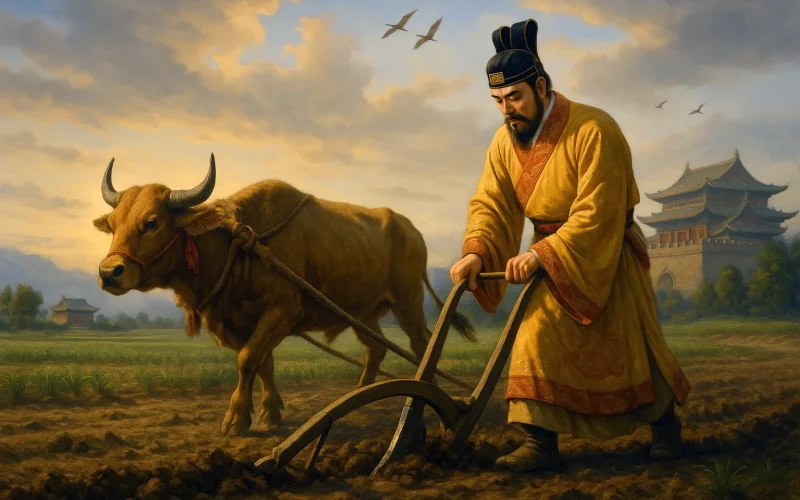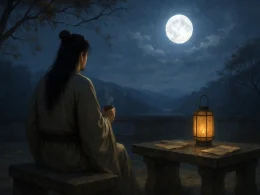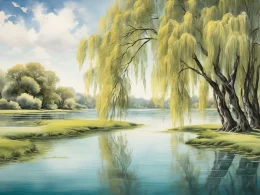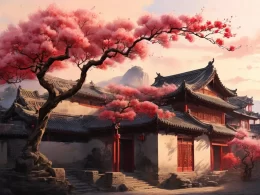This age discards scholars like weeds,
Cast to Xiang River's reedless shores.
Sunlight floods the seas—but who heeds
Stones that chime where no ear adores?
Plucked-wing birds on dead boughs cry,
Dipping, rising—mournful tune.
North winds spit clouds cold and dry,
Autumn's end—a barren noon.
Nobles still roam at their ease,
While we petty men must freeze.
Day by day our sorrows grow,
Nurturing grief none can know.
Let's drain this cup of wine we share,
Sing loud—though none will ever care.
Pity no musician stays
To string my verse in finer ways.
Original Poem
「零陵赠李卿元侍御简吴武陵」
柳宗元
理世固轻士,弃捐湘之湄。
阳光竟四溟,敲石安所施。
铩羽集枯干,低昂互鸣悲。
朔云吐风寒,寂历穷秋时。
君子尚容与,小人守兢危。
惨凄日相视,离忧坐自滋。
樽酒聊可酌,放歌谅徒为。
惜无协律者,窈眇弦吾诗。
Interpretation
This poem was composed in autumn 812 AD during Emperor Xianzong's Yuanhe era, while Liu Zongyuan was exiled in Yongzhou. The "Wu Wuling" mentioned in the poem was a close friend and kindred spirit Liu met during their shared exile. As Wu Wuling had just been pardoned and allowed to return north, while Liu remained stranded in Lingling, the poet expresses his melancholy. Criticizing the political darkness that discarded worthy talents, Liu directs fierce satire toward the regime while dedicating the poem to Wu Wuling and Li Qingyuan, affirming the deep camaraderie among exiled scholars. The poem balances profound emotion with dignified restraint, standing as a representative work of Liu's political critique and moral resilience during his banishment.
First Couplet: "理世固轻士,弃捐湘之湄。"
Lǐshì gù qīng shì, qìjuān Xiāng zhī méi.
This "well-governed age" scorns scholars, casting them to the wilds by Xiang River's shore.
The opening couplet exposes the era's absurdity and darkness. "Well-governed age" is ironic—true governance is absent. "Casting away" conveys outrage at the waste of talent, establishing the poem's critical tone.
Second Couplet: "阳光竟四溟,敲石安所施。"
Yángguāng jìng sì míng, qiāo shí ān suǒ shī.
When sunlight floods the seas, what use is a flint's spark?
Superficially logical, these lines are sharp satire. "Sunlight" symbolizes the "peaceful reign," while "flint" represents reformers' talents, mocking how authorities suppress dissent under the pretense of stability.
Third Couplet: "铩羽集枯干,低昂互鸣悲。"
Shā yǔ jí kū gān, dī áng hù míng bēi.
Wing-clipped birds perch on barren boughs, now drooping, now lifting heads in mournful cries.
"Wing-clipped birds" metaphorize exiled scholars; "barren boughs" reflect their desolation. "Mournful cries" convey shared grief and mutual understanding among the banished.
Fourth Couplet: "朔云吐风寒,寂历穷秋时。"
Shuò yún tǔ fēng hán, jìlì qióng qiū shí.
Northern winds spew icy gusts—a desolate, depth-of-autumn hour.
Nature mirrors political harshness. "Depth-of-autumn" symbolizes the era's decay, while "icy gusts" embody the regime's cruelty.
Fifth Couplet: "君子尚容与,小人守兢危。"
Jūnzǐ shàng róngyǔ, xiǎorén shǒu jīng wēi.
Noble men remain composed; base men cling to trembling fear.
A moral contrast: exiled scholars uphold dignity, while petty opportunists, though in power, live in constant anxiety.
Sixth Couplet: "惨凄日相视,离忧坐自滋。"
Cǎnqī rì xiāng shì, lí yōu zuò zì zī.
Day after day, we face each other in grief; separation's sorrow grows unchecked.
Exiles console one another, yet prolonged isolation deepens their despair, intensifying the poem's emotional weight.
Seventh Couplet: "樽酒聊可酌,放歌谅徒为。"
Zūn jiǔ liáo kě zhuó, fànggē liàng tú wèi.
A cup of wine offers fleeting solace; singing aloud is but a futile vent.
Wine and song provide momentary relief, yet the poet acknowledges their futility against unchangeable realities.
Eighth Couplet: "惜无协律者,窈眇弦吾诗。"
Xī wú xiélǜ zhě, yǎomiǎo xián wú shī.
Alas, no kindred soul remains to set my verse to strings—its melancholy strains now fade unheard.
The closing lament—"no kindred soul"—expresses the pain of losing Wu Wuling as both a friend and intellectual ally, ending with solitary artistic integrity.
Beginning with indignation, the poem progresses through themes of persecution, hostile environments, and the pain of parting. It culminates in the resigned solace of poetry and wine, blending scathing political critique with genuine friendship. Throughout, Liu Zongyuan's clarity of vision, moral fortitude, and emotional depth remain unwavering.
Holistic Appreciation
Though framed as a farewell poem, this work transcends its occasion to become a meditation on ideals, a critique of society, and a philosophical reflection. Written during his exile, Liu Zongyuan exposes with piercing clarity the hypocrisy of a court that rejects talent and obscures truth, transforming shared indignation among kindred spirits into potent poetic force. The poem blends biting social commentary with unyielding personal integrity and profound camaraderie, creating rich emotional layers within a tightly structured artistic form. It stands as a cornerstone of Liu's "Yongzhou Cycle."
Artistically, the poet masterfully employs symbolism and irony. Images like "sunlight flooding the seas" (a veiled reference to pervasive darkness), "striking stones" (hinting at futile efforts), "withered trunks," and "barren autumn" all carry subtext—scenery imbued with emotion, words laced with satire. This exemplifies Liu's signature "incisive and unrelenting" style. The closing line, "my poems strung on faint, distant chords," elevates the entire work to a spiritual pinnacle of sublime loneliness and towering resolve.
Artistic Merits
- Irony and Symbolism Intertwined
The poem's cutting satire operates through inverted meanings: "sunlit seas" actually depict systemic darkness; "orderly eras disdain scholars" mocks misgovernment suppressing talent. This showcases Liu's linguistic precision and unique voice. - Potent Imagery, Profound Emotion
Symbols like "clipped wings," "parched trunks," and "northern clouds" viscerally convey exiled intellectuals' plight, amplifying the poet's anguish and defiance. - Architectural Structure, Reason-Emotion Fusion
Three thematic movements unfold: opening satire, middle-section portrayal of oppressed scholars, and a finale celebrating intellectual kinship. Anger yields to sorrow, sorrow to quietude—a clear, expansive rhythm. - Accessible Language, Abyssal Depth
Deceptively plain diction conceals layers of meaning, each couplet saturated with Liu's clear-eyed scrutiny of reality and unflinching emotional honesty.
Insights
This work transcends its occasion as a parting gift to become a clarion call against oppression and for moral steadfastness. It teaches that true scholars anchor themselves not in worldly success but in unshakable principles; though exiled and maligned, their greatest armor is mutual understanding among peers.
In our era, we still need Liu Zongyuan's courage to speak truth and fortitude to endure, just as we need friends like Wu Wuling—those who, though scattered and suffering, never compromise. The "faint, distant chords" of poetry need not signify utter isolation, but rather a transcendent harmony beyond temporal strife. True worth resonates quietly among those who truly listen.
About the Poet

Liu Zongyuan (柳宗元, 773 - 819), a native of Yuncheng in Shanxi province, was a pioneering advocate of the Classical Prose Movement during China's Tang Dynasty. Awarded the prestigious jinshi degree in 793 during the Zhenyuan era, this distinguished scholar-official revolutionized Chinese literature with his groundbreaking essays. His prose works, remarkable for their incisive vigor and crystalline purity, established the canonical model for landscape travel writing that would influence generations. As a poet, Liu mastered a distinctive style of luminous clarity and solitary grandeur, securing his place among the legendary "Eight Great Masters of Tang-Song Prose" - an honor reflecting his enduring impact on Chinese literary history.












